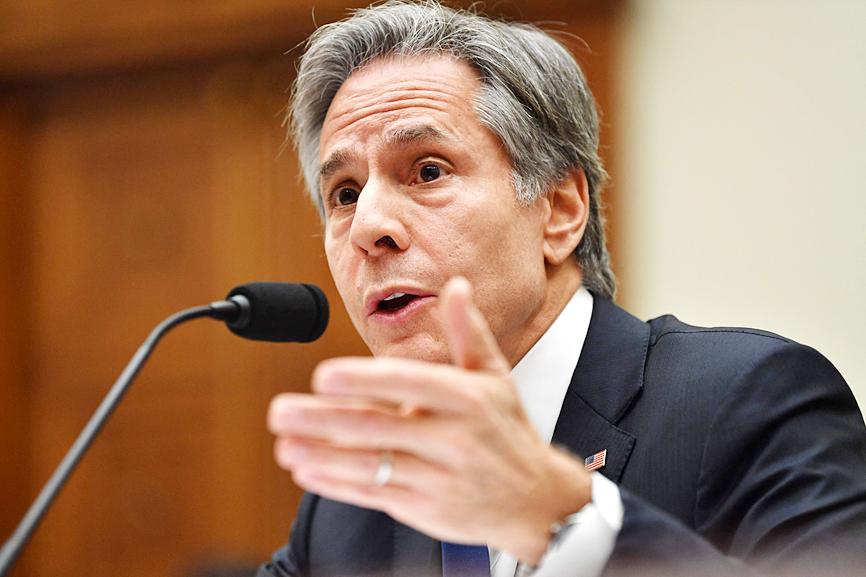The US is to “engage virtually every country” in the region in creating the Indo-Pacific Economic Framework (IPEF), US Secretary of State Antony Blinken said on Thursday, as he dismissed concerns that Washington had shut the door on Taiwan.
At a hearing of the US House of Representatives Committee on Foreign Affairs, US Representative Ann Wagner asked Blinken whether Taiwan was being excluded from joining the IPEF, an initiative proposed by US President Joe Biden last year with the aim of enhancing its economic engagement in the Indo-Pacific region.
“I am particularly concerned that Taiwan is being shut out of the Indo-Pacific Economic Framework, even though the administration may try to kind of hide this by never formally closing the doors, so to speak, to participation; Taiwan’s offer to become a full member is not being accepted,” Wagner said.

Photo: AFP
Wagner said the policy to deny Taiwan’s participation in the IPEF is “self-defeating and dangerous” given that it was the US’ eighth-largest trading partner last year and one of its largest trading partners in Asia.
Blinken said “there is no such policy” to exclude Taiwan.
“There is nothing that is closing the door on anyone, including Taiwan,” he added.
The US has just started the process of launching the IPEF, including beginning conversations with a number of countries as potential partners, Blinken said.
“It’s going to be open, it’s going to be inclusive and I imagine we’re going to be engaging virtually every country in the region,” he added.
Wagner said that Taiwan had made it clear to the US in recent bilateral talks that becoming a full member of the IPEF is its “No. 1 and top request,” and Taipei has changed national laws in anticipation of starting free-trade negotiations.
She urged Blinken to send more reaffirming messages to Taiwan.
“As a rule of law, democracy and a top global trading partner, Taiwan should certainly be a top priority for the framework,” Wagner said. “But instead, this administration is marginalizing Taiwan and showing the Chinese Communist Party that the United States is deterred from working with a critical partner.”
Similar concerns have been raised by other US lawmakers.
A bipartisan group of 200 US representatives on March 30 published a letter addressed to US Secretary of Commerce Gina Raimondo and US Trade Representative Katherine Tai (戴琪) to petition for Taiwan’s inclusion in the IPEF.
Reuters cited unnamed sources in a March 31 story as saying that Raimondo told a closed-door meeting of the US Senate Finance Committee the week before that the administration was not considering Taiwan’s inclusion at this time.

Right-wing political scientist Laura Fernandez on Sunday won Costa Rica’s presidential election by a landslide, after promising to crack down on rising violence linked to the cocaine trade. Fernandez’s nearest rival, economist Alvaro Ramos, conceded defeat as results showed the ruling party far exceeding the threshold of 40 percent needed to avoid a runoff. With 94 percent of polling stations counted, the political heir of outgoing Costa Rican President Rodrigo Chaves had captured 48.3 percent of the vote compared with Ramos’ 33.4 percent, the Supreme Electoral Tribunal said. As soon as the first results were announced, members of Fernandez’s Sovereign People’s Party

MORE RESPONSIBILITY: Draftees would be expected to fight alongside professional soldiers, likely requiring the transformation of some training brigades into combat units The armed forces are to start incorporating new conscripts into combined arms brigades this year to enhance combat readiness, the Executive Yuan’s latest policy report said. The new policy would affect Taiwanese men entering the military for their compulsory service, which was extended to one year under reforms by then-president Tsai Ing-wen (蔡英文) in 2022. The conscripts would be trained to operate machine guns, uncrewed aerial vehicles, anti-tank guided missile launchers and Stinger air defense systems, the report said, adding that the basic training would be lengthened to eight weeks. After basic training, conscripts would be sorted into infantry battalions that would take

GROWING AMBITIONS: The scale and tempo of the operations show that the Strait has become the core theater for China to expand its security interests, the report said Chinese military aircraft incursions around Taiwan have surged nearly 15-fold over the past five years, according to a report released yesterday by the Democratic Progressive Party’s (DPP) Department of China Affairs. Sorties in the Taiwan Strait were previously irregular, totaling 380 in 2020, but have since evolved into routine operations, the report showed. “This demonstrates that the Taiwan Strait has become both the starting point and testing ground for Beijing’s expansionist ambitions,” it said. Driven by military expansionism, China is systematically pursuing actions aimed at altering the regional “status quo,” the department said, adding that Taiwan represents the most critical link in China’s

EMERGING FIELDS: The Chinese president said that the two countries would explore cooperation in green technology, the digital economy and artificial intelligence Chinese President Xi Jinping (習近平) yesterday called for an “equal and orderly multipolar world” in the face of “unilateral bullying,” in an apparent jab at the US. Xi was speaking during talks in Beijing with Uruguayan President Yamandu Orsi, the first South American leader to visit China since US special forces captured then-Venezuelan president Nicolas Maduro last month — an operation that Beijing condemned as a violation of sovereignty. Orsi follows a slew of leaders to have visited China seeking to boost ties with the world’s second-largest economy to hedge against US President Donald Trump’s increasingly unpredictable administration. “The international situation is fraught